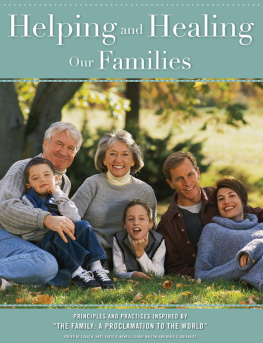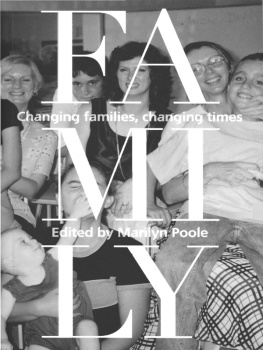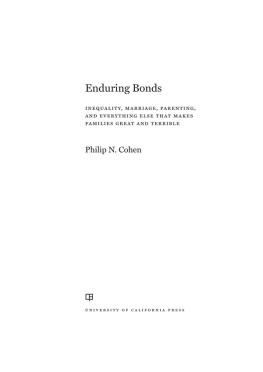Families
Joys, Conflicts, and Changes
Families
Joys, Conflicts, and Changes
Alex Liazos
Regis College
First published 2004 by Paradigm Publishers
Published 2016 by Routledge
2 Park Square, Milton Park, Abingdon, Oxon OX14 4RN
711 Third Avenue, New York, NY 10017, USA
Routledge is an imprint of the Taylor & Francis Group, an informa business
Copyright 2004, Taylor & Francis.
All rights reserved. No part of this book may be reprinted or reproduced or utilised in any form or by any electronic, mechanical, or other means, now known or hereafter invented, including photocopying and recording, or in any information storage or retrieval system, without permission in writing from the publishers.
Notice:
Product or corporate names may be trademarks or registered trademarks, and are used only for identification and explanation without intent to infringe.
Library of Congress Cataloging-in-Publication Data
Liazos, Alex, 1941
Families : joys, conflicts, and changes / Alex Liazos.
p. cm.
Includes bibliographical references and index.
ISBN 1594510164 (alk. cloth)ISBN 1594510172 (pbk. : alk. paper)
1. FamilyUnited States. 2. Family. I. Title.
HQ536.L53 2004
306.850973dc22
003022454
Designed and Typeset by Straight Creek Bookmakers
ISBN 13 : 978-1-59451-016-8 (hbk)
ISBN 13 : 978-1-59451-017-5 (pbk)
Lovingly and longingly dedicated to
My aunt Sofia Liazos Stratis (19171994), a gentle and wise woman
Our long talks and her memory are with me always.
My daughters and their husbands,
Melissa and Rudd,
and Ariane and Tony,
for all the times we have enjoyed together
And the future of our family:
my grandnieces
Ariadne, Eftihia, Eleftheria, Georgia,
Natasha, Rachel, and Sofia;
and grandnephews
Christopher, Christos, and Thomas
Contents in Brief
Detailed Contents
/ Gender Feuds
Writing this book has been a satisfying and challenging experience. It has been a journey of social discovery, and of self and family exploration. I present scenes of family joys and of playful times from many places and times. I hope it will be a voyage of discovery for you, too. In that spirit, you might try writing your family history, an assignment that students in my family course always find gratifying and informative. While they research that history, they often unearth new relatives and family events.
This is a selective text. I explore fewer family issues in depth rather than try to provide an encyclopedic review of all fields. For example, I discuss in depth the connections between families, kin, and communities, something few texts even mention. On the other hand, as important as marital communication is, I do not devote the space to it that some texts do.
I present a point of view on families, but I also try to be balanced and fair to other perspectives. For example, I provide extensive summaries and quotations of writers who worry that families are falling apart (see and elsewhere), although I disagree with them. I encourage you to reflect on and debate the various studies and interpretations I provide. I especially hope you will use this book to reflect on your family, other families you know, and families in general. Please question, debate, and discuss everything you read hereand in all books.
Data found in the book are, whenever possible, from the most recent U.S. Census in 2000. Most family studies I present are also recent, since the 1990s. But I also present studies from earlier years, both because they are well-established classics and because in important ways they still reflect the world today. They also tell us how we arrived where we are now. But the world changes constantly. You should bear this in mind and read this textlike all textscritically and with a vigilant eye on the world, which both changes and stays the same.
This text has some distinct features and approaches.
1. It presents all three realities of family lives and family relationships:
the joys of being together and supporting each other
the conflicts between family members
the changes that have been happening in families throughout history
2. It explores the wide variety of families historically and across cultures and allows us to understand family changes, such as the gradual acceptance of same-sex marriage.
3. It offers two chapters not found in other texts:
Family Living explores the social value of caregiving, family meals, and other family activities.
Kin and Community shows how families are connected to their extended family kin and their communities.
4. Other coverage and features include:
Families and migration
Women, men, work, and housework
Social policies to support all kinds of families
New family forms and family changes emphasized throughout the book
Family changes and families in other cultures presented in all chapters
Extensive coverage and discussion of major research, scholars, and ethnographies (for examples, see the list in Acknowledgements)
5. I also present examples from my own family history: camping trips and other good times with my daughters; visits to my family in our ancestral village of Longo, Albania; the family, kin, and community history of my beloved Aunt Sofia, to whom I dedicate this book; and others.
For those of us who write textbooks, our first and foremost debt should be to the hundreds and thousands of people whose research and writing provide the information, inspiration, and explanations we use in our texts. I am deeply grateful to all of you.
I would like to acknowledge especially the following writers whose works have inspired, informed, and guided much of the thinking and writing that went into this book. (Publication information for each work is found in the reference list.)
Stephanie Coontz, The Way We Really Are: Coming to Terms with Americas Changing Families
John Demos, A Little Commonwealth: Family Life in Plymouth Colony
Francine Deutsch, Halving It All: How Equally Shared Parenting Works
Arlie Russell Hochschild, The Second Shift: Working Parents and the Revolution at Home and The Time Bind: When Work Becomes Home and Home Becomes Work
Robert S. Lynd and Helen Merrell Lynd, Middletown: A Study in Modern American Culture and Middletown in Transition
Jerre Mangione, Mount Allegro: A Memoir of Italian American Life
Letty Cottin Pogrebin, Family Politics: Love and Power on an Intimate Frontier
Glenda Riley, Divorce: An American Tradition
Lillian B. Rubin, Worlds of Pain: Life in the Working-Class Family; and Intimate Strangers: Men and Women Together; and Families on the Fault Line: Americas Working Class Speaks About the Family, the Economy, Race, and Ethnicity
Marjorie Shostak, Nisa: The Life and Words of a !Kung Woman
Carol Stack, All Our Kin and Call to Home: African Americans Reclaim the Rural South
Colin Turnbull,






